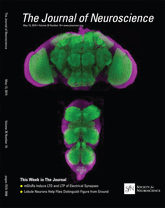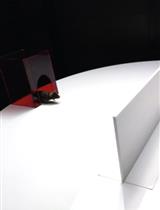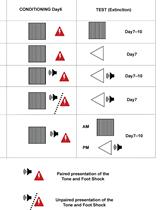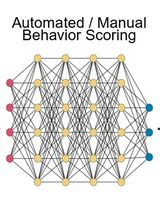- EN - English
- CN - 中文
A Novel Task for Studying Memory of Occasional Events in Rats
大鼠偶尔事件记忆研究的新模型
(*contributed equally to this work) 发布: 2016年03月05日第6卷第5期 DOI: 10.21769/BioProtoc.1740 浏览次数: 9455
评审: Soyun KimManuel SarmientoEdgar Soria-Gomez
Abstract
Episodic memory has been defined in humans as the conscious recollection of unique personal past experiences often occurring singly during daily life, including remembrance of what happened, where and when it happened (Tulving, 1972). Here, we propose and describe in details a novel protocol we recently used to test the ability of rats to form and recollect episodic-like memory of previously encountered occasional episodes (Veyrac et al., 2015). During these episodes, the animals are briefly exposed to sets of specific odor–drink associations (what happened) encountered in specific locations (where it happened) within different multisensory enriched environments (in which context/occasion it happened). Memory of the episodes can be tested at relatively short (24 h) or much longer (24 d) delays in either a low or high interfering retrieval situation. This novel paradigm brought evidence for individual memory profiles of recall performance that might be correlated to different aspects of brain functional networks. More generally, it offers novel possibilities to explore cellular and network mechanisms that underlie memory of past events and memory dysfunction in brain pathologies.
Keywords: Episodic memory (情景记忆)Materials and Reagents
- Subjects
All experiments were conducted in accordance with European guidelines for care of laboratory animals (2010/63/EU) and received approval from the Lyon 1 University Ethics Committee (permission DR2015-46). Adult male Long-Evans rats (Charles River Laboratories) aged 7-8 weeks (~300-350 g) at the start of the water deprivation protocol, are housed in groups of 2-4 per cage and kept in an environment with controlled temperature and humidity under a 12/12 h light/dark cycle with food ad libitum. Experiments are conducted during the light period.
Note: So far these experiments have not been conducted with other strains of rats or mice, but we assume that usage of other strains shouldn’t introduce major difficulties to carry out the experiments. Nevertheless, according to the fact that contexts are characterized by visual stimulation, working with albinos rats might be more challenging. Regarding mice, some adjustments to the experimental device would be required. - Odorants
In order to be delivered in a fully controlled manner through a new generation of olfactometer (Sezille et al., 2013), each odorant is introduced in a U-shaped Pyrex® tube (volume: 10 ml; length: 50 mm; external diameter: 14 mm) (VS technologies) filled with microporous granules. All odors used in these experiments were obtained from Sigma-Aldrich, France (see a-f below).- Geraniol (Sigma-Aldrich, catalog number: 163333 ) 20% of saturated vapor pressure
- Eugenol (Sigma-Aldrich, catalog number: E51791 ) 18% of saturated vapor pressure
- (S)-(+)-Carvon (Sigma-Aldrich, catalog number: 435759 ) 35% of saturated vapor pressure = Odor A
- Isoamylacetate (Sigma-Aldrich, catalog number: W205508 ) 15% of saturated vapor pressure = Odor B
- Trans-Anethole (Sigma-Aldrich, catalog number: 117870 ) 30% of saturated vapor pressure = Odor C
- Citral (cis+trans) (Sigma-Aldrich, catalog number: W230308 ) 20% of saturated vapor pressure = Odor D
Note: Before the start of experiments, between 2 and 4 ml of pure odor solution are introduced gradually on several consecutive days into the U Shaped Glass Tubes until the microporous granules appear saturated (Figure 1) (for the experiments, the odors should be at saturated vapor pressure in the tube, at the same time in order to prevent olfactometer pollution it is important to avoid the accumulation of liquid at the bottom of the tube). The percentage of saturated vapor pressure introduced into the airflow is adjusted for each odor individually by the experimenter. The objective is to obtain an intensity that is perceived by the animal but moderate enough to prevent any avoidance behavior. For the different odors used in pairs, we also try to equalize their perceived intensity. The choice of these particular odors and concentrations was mainly determined by previous experiments in the lab showing their easy discriminability and the absence of their natural attractiveness or repulsiveness to the rats at the concentrations used (Martin et al., 2004; Courtiol et al., 2014; Torquet et al., 2014).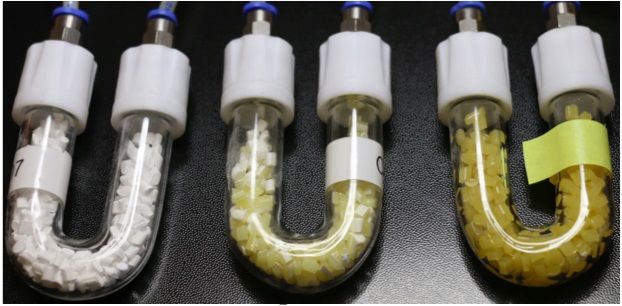
Figure 1. A photo of the U-shaped Pyrex tube filled with microporous granules showing different levels of saturation with Carvon odor solution. From left to right: pure granules without any added odor solution; partly saturated granules; fully saturated granules as used for the experiments.
- Geraniol (Sigma-Aldrich, catalog number: 163333 ) 20% of saturated vapor pressure
- Drinking solutions
Equipment
- Apparatus (EPISODICAGE)
The experimental cage is a PVC rectangular box (60 x 35 x 40 cm) equipped with 4 devices for delivery of different odor and drinking solutions (Figure 2A) (Belkacem Messaoudi). On the two opposing walls, at 5 cm distance from each corner of the box, the cage contains an arrangement of odor and drinking ports. The odor port is a round indentation into the wall (5 x 5 cm in size), with a drinking port (small hole, 1 x 1 cm in size) placed 1cm below the odor port through which a drinking pipette can be inserted into the cage (Figure 1B).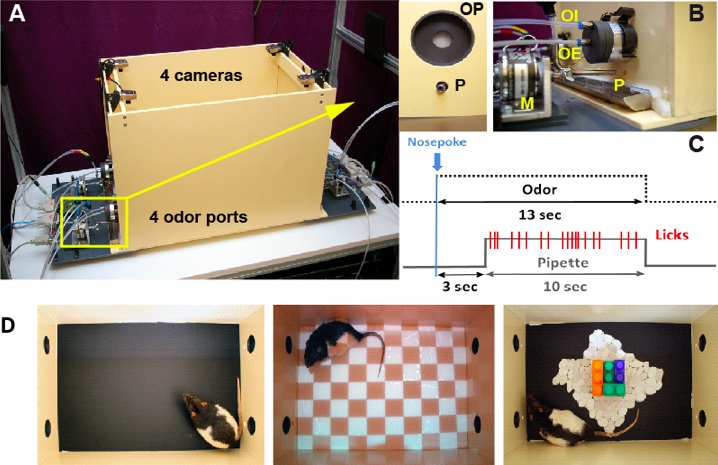
Figure 2. The EPISODICAGE. A. General view of the experimental cage showing the four cameras installed above each of the four odor ports. B. Details of an odor port (OP) with associated drinking pipette (P), view from the inside (left figure) or the outside (right figure) of the cage: odor injection (OI) and odor extraction (OE), motor (M), which allows introducing and withdrawing the pipette from the cage. C. Each nose poke first triggers an odor delivery for 13 sec. Three seconds after odor initiation, a pipette containing various drinking solutions (water, sugar or quinine) is introduced into the cage for 10 sec until the odor stimulation switches off. Each lick on the pipette made by the rat is detected and recorded by the computer devoted to the control of the experimental cage. Each trial starts with the nose poke and ends with withdrawal of the pipette and odor switch off. D. On the left, appearance of the cage in the version used in routine sessions. The two other pictures illustrate how the appearance of the cage can be modified by projecting visual patterns on the ground (center picture) or introducing objects (right picture). Figure adapted from Veyrac et al. (2015).- Odor port
When a rat makes a nose poke into the port, a capacitance change is detected by the system that immediately triggers for 13 sec the introduction of odor-saturated vapor into a constant airflow (air flow overall: 1 liter/min). The proportion of odorized air and the quality of the odorant are controlled through a custom made olfactometer connected to the odor port (OI) (Figure 1B). In a given experimental session, five different odors can be delivered at each of the four odor ports. A venturi-based system of aspiration allows extraction of the odorized air through a separate channel, so that the odor remains limited to the port (OE) (Figure 1B). A permanent compensation of OI and OE prevents any change in overall air pressure due to odor switch.
Note: Rats are highly sensitive to changes in air pressure. To prevent any behavioral response to mechanical stimulation, air pressure must be kept at the same level during the presence and absence of odors. - Drinking port
Each movable drinking pipette is connected to a pump. The pipette is introduced into the cage 3 sec after the first nose poke of the animal and is withdrawn from the cage 10 sec later simultaneously with termination of odor release (Figure 1C). This ensures that the odor stimulation is delivered during the entire liquid consumption. A second capacitance change sensor integrated into the drinking pipette detects every single lick of the animal and triggers the pump which in turn delivers a calibrated amount of 8-9 µl of drinking solution. The licks made by the rats are recorded as text files for later analysis of the results.
Note: The amount of liquid delivered upon each lick from the drinking ports must be equal between the ports (the variation should be within 8±1 µl), in order to avoid any preference of the animals for a particular port.
Different drinking solutions can be delivered by the system, water, sucrose or quinine solutions according to the different phases of the protocol and the odor-port configurations. After each trial and retraction of the pipette, the drinking solution device is purged with the solution of the following trial.
Note: Purge duration is set in a way that allows the complete wash out of the drinking solution of the last trial. This was verified through addition of ink into the water before the start of experiments.
- Odor port
- Items for contextual enrichment during episodes
Acoustic context
Different types of sounds can be played through two loudspeakers symmetrically placed above the experimental arena to enhance the discriminability of the episodes: nature sounds, bird songs, piano music …etc. The general guideline for choosing these sounds was their discriminability as validated in spectrograms and the animals/experimenter’s well-being.
Tactile and visual context
Different types of floors can be used with distinct tactile and visual characteristics (Figure 1D). As color vision in rats is poor, combinations of high-contrast black and white coloring of materials are preferred. Additionally, visual patterns can also be displayed on the floor by a video projector and various objects can be placed into the box. - Video recording
Five cameras are used to monitor precisely the behavior of the rats, one placed centrally above the experimental box and four others each placed above the four odor ports. The position of the rat is detected online via a video tracking software from the signal recorded from the central camera. When the animal approaches a port, the corresponding camera is selected for signal acquisition. This allows us to save space occupied by the video files.
Software
- VOLCAN (Marc Thevenet)
Procedure
文章信息
版权信息
© 2016 The Authors; exclusive licensee Bio-protocol LLC.
如何引用
Readers should cite both the Bio-protocol article and the original research article where this protocol was used:
- Allerborn, M., Gros, A., Messaoudi, B., Gervasoni, D., Garcia, S., Thevenet, M., Laroche, S., Veyrac, A. and Ravel, N. (2016). A Novel Task for Studying Memory of Occasional Events in Rats. Bio-protocol 6(5): e1740. DOI: 10.21769/BioProtoc.1740.
-
Veyrac, A., Allerborn, M., Gros, A., Michon, F., Raguet, L., Kenney, J., Godinot, F., Thevenet, M., Garcia, S., Messaoudi, B., Laroche, S. and Ravel, N. (2015). Memory of occasional events in rats: individual episodic memory profiles, flexibility, and neural substrate. J Neurosci 35(19): 7575-7586.
分类
神经科学 > 行为神经科学 > 学习和记忆
您对这篇实验方法有问题吗?
在此处发布您的问题,我们将邀请本文作者来回答。同时,我们会将您的问题发布到Bio-protocol Exchange,以便寻求社区成员的帮助。
Share
Bluesky
X
Copy link






